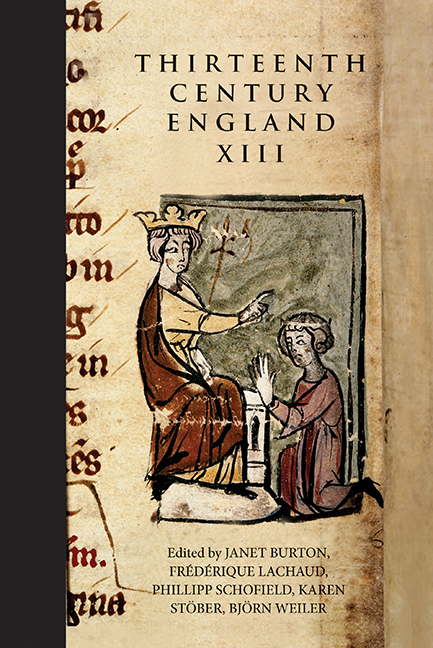Book contents
- Frontmatter
- Contents
- List of Illustrations
- Preface
- Contributors
- Abbreviations
- Political Ideas and Dialogue in England in the Twelfth and Thirteenth Centuries
- Peripatetic and Sedentary Kingship: The Itineraries of John and Henry III
- Peter of Aigueblanche's Support Network
- A Captive King: Henry III between the Battles of Lewes and Evesham, 1264–5
- The Conflictus inter Deum et Diabolum and the Emergence of the Literature of Law in Thirteenth-Century England
- Prosecuting Ravishment in Thirteenth-Century England
- John of Crakehall: The ‘Forgotten’ Baronial Treasurer, 1258–60
- Credit Finance in Thirteenth-Century England: The Ricciardi of Lucca and Edward I, 1272–94
- (Socio)linguistic Realities of Cross-Channel Communication in the Thirteenth Century
- The Treaties of Paris
The Conflictus inter Deum et Diabolum and the Emergence of the Literature of Law in Thirteenth-Century England
Published online by Cambridge University Press: 15 September 2017
- Frontmatter
- Contents
- List of Illustrations
- Preface
- Contributors
- Abbreviations
- Political Ideas and Dialogue in England in the Twelfth and Thirteenth Centuries
- Peripatetic and Sedentary Kingship: The Itineraries of John and Henry III
- Peter of Aigueblanche's Support Network
- A Captive King: Henry III between the Battles of Lewes and Evesham, 1264–5
- The Conflictus inter Deum et Diabolum and the Emergence of the Literature of Law in Thirteenth-Century England
- Prosecuting Ravishment in Thirteenth-Century England
- John of Crakehall: The ‘Forgotten’ Baronial Treasurer, 1258–60
- Credit Finance in Thirteenth-Century England: The Ricciardi of Lucca and Edward I, 1272–94
- (Socio)linguistic Realities of Cross-Channel Communication in the Thirteenth Century
- The Treaties of Paris
Summary
The Conflictus inter Deum et Diabolum is a medieval Latin text whose principal subject is the theological doctrine of the Redemption of human kind, the central doctrine of Christianity. The Conflictus is known to survive in three manuscripts, all of English provenance. The earliest manuscript, Oxford, Bodleian Library, MS Ashmole 1398, is described as written in a ‘charter hand of the thirteenth century’ which is one piece of evidence for locating the Conflictus to the thirteenth century and therefore making a discussion of the text and the issues it raises appropriate for this volume. The other two manuscripts are dated to the fourteenth century and the fifteenth century, which suggests an enduring, if fragile, textual history and continuous interest in the text.
The Conflictus is not well known to modern scholarship and for this reason it will be useful to provide a brief summary. It is cast in the form of a legal dispute, and begins in this way:
Videns itaque diabolus suam tirannidem expirasse quam diu in hominem exercuerat et se spoliatum homine quem longissimi temporis spacio sine contradictione possederat captiuum, frendebat sibi iniuriam irrogari et se illicita potencia non ordine iudiciario sed illegitime sua possessione expelli et priuari. In Christum itaque mouere querimoniam intendit et ei interdictum Vnde vi statim obicere proponit. Volens autem dominus ei satisfacere prefixit ei diem litis idoneum quo possit se suis rationibus premunire et sua instrumenta si haberet introducere. (ll. 7–14)
(Seeing therefore that the tyranny that he had for a long time exerted over humanity had vanished and that he had been robbed of human kind whom he had held captive without objection for a very long time, the Devil complained that injury had been done to him and that he had been unlawfully deprived of his possession through the unlawful use of power, not through judicial procedure. The Devil therefore launched a complaint against Christ and proposed to invoke the interdict Vnde vi. The Lord God, wishing to treat the Devil fairly, fixed a suitable day for documents, if he had any.)
Before the trial begins, the Devil is asked if he possibly regrets bringing the charge and if he might not consider withdrawing his action.
- Type
- Chapter
- Information
- Thirteenth Century England XIIIProceedings of the Paris Conference, 2009, pp. 57 - 66Publisher: Boydell & BrewerPrint publication year: 2011



